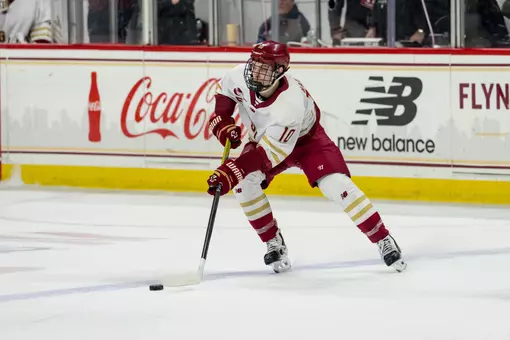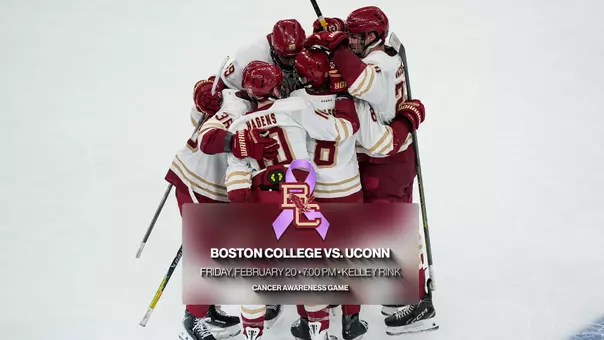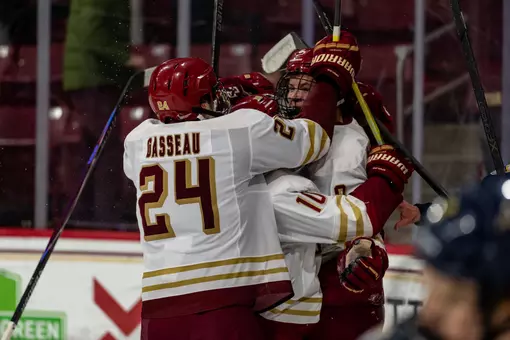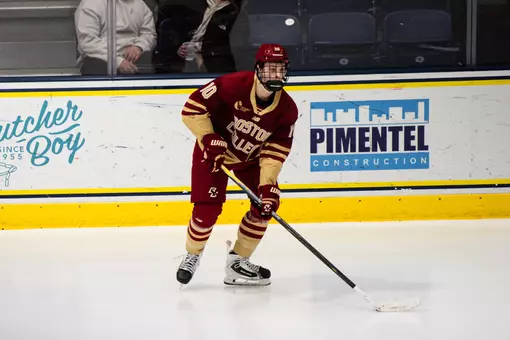Boston College Athletics
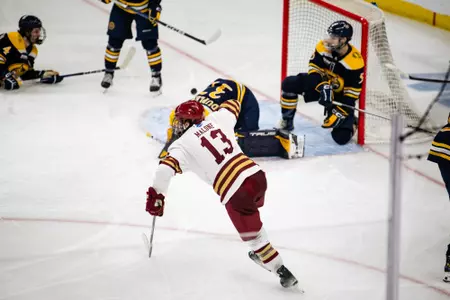
Photo by: Brody Hannon
Instant Classic Forces BC To Earn Its Way To St. Paul
April 02, 2024 | Men's Hockey, #ForBoston Files
Quinnipiac was ever the valiant defending champion.
The ending to Sunday's Regional Final between Boston College and Quinnipiac felt all too fitting after the defending national champion Bobcats pushed the top-ranked Eagles to the limit for three-plus periods. Quinnipiac never trailed during regulation, but watched BC negate a 2-0 lead before the Eagles scored a third game-tying goal in the late stages of the third period, and the 4-4 game now advanced to an extra session reminiscent of their season-opening game six months earlier.
Quinnipiac possessed the up-and-down skating chops to hang tough shifts on BC, but the Eagles found themselves once again moving pieces around the chess board as they set up their offense against head coach Rand Pecknold's trademark defense. Everyone marked up their respective man, but the seas parted enough for a shot from the point that goalie Vinny Duplessis, a Boston University transfer, handled with relative ease.
Duplessis had gone head-to-head with Jacob Fowler for literally three hours, but his final save dropped in front of him as the Eagles crashed from two angles. He fell to his rump as two defensemen bottlenecked Colby Ambrosio at the front of the net, and defenseman CJ McGee took the last angle as Jack Malone trailed near the faceoff circle. Forward Christophe Tellier popped out, but the puck squirted into the Cornell transfer's line of vision as the goal mouth opened in front of him.
He didn't need more than the red light to tell him where his shot landed. Three hours and one minute after the first puck dropped, an instant classic between the No. 1 team in the nation and the defending national champion was over. Boston College was heading to Saint Paul, Minnesota. Quinnipiac was heading home.
Eagles 5. Bobcats 4.
"Everyone got to see a heck of a hockey game," said BC head coach Greg Brown. "It's always hard to play a team that's won [a championship] because they know what it takes. They don't beat themselves, and you've got to do a lot of things right. Quinnipiac kept taking the lead on us, [but] I thought our guys did a great job of not getting down and staying very positive on the bench. Even when the clock started getting down in the third…the bench kept talking, 'keep going, keep going.' It got us jumping again, and we finished the third very solidly. Then in overtime, we had our legs, we had some good jump, got a few pucks to the net, and Jack was able to finish it off. All in all, we beat a very good team. We didn't have a tough start like we did [against Michigan Tech], and we're pretty excited to be going to Saint Paul."
Malone's goal capped a second impressive comeback on a day when Quinnipiac used BC's own style to negate the Eagles' perceived advantages in north-south skating. The Bobcats used a spillover power play to gain a space advantage on their first goal in the second period, and their second goal occurred as BC found itself shell-shocked by the quick strike to start the frame. Ryan Leonard's 30th goal of the season came another 30 seconds later, but BC felt like it remained a step behind a Quinnipiac team that used its defensive mindset to gain a significant foothold after those early goals.
"I came from Cornell," Malone explained, "so I've had some experience with Quinnipiac. They're just real good defensively. They're consistently giving up the least amount of shots in the NCAA. I think that was the toughest puzzle to solve, just their defensive game and getting pucks through and creating some chaos in front of the net."
Crediting defensive hockey and goaltending is ironic in a period with a combined six goals, but both teams staggered rushes and counterattacks by using their internal monologues to their respective advantages. They each skated similar styles, but the nuances pit BC's overall intense, lightning-fast attack against the even-keeled and controlled energy of Quinnipiac's game. Where the Eagles used vision, the Bobcats used a passion to lock their own culture into full view, and both teams bombed around the ice by identifying where their own inefficiencies could turn into another team's chances.
"They do such a great job in their own D-zone of making you feel like you don't have as much time," Malone explained. "[They] kind of force plays to their advantage when they're able to transition well, [and] their goalie made some unreal saves in the first period. You have to give him credit if you haven't because he was hard to solve."
"It's a tough way to end," Quinnipiac head coach Rand Pecknold said, "but it's a fantastic group of young men. Our culture was on display all year [with] the buy-in and playing the way we need to play. We're never perfect, but you don't need [perfection]. Nobody's perfect. I just like how hard they play and how hard they battle. The passion was awesome this weekend. They were bleeding navy and gold, so I'm just proud of the effort."
Quinnipiac locked into the tournament as a No. 3 seed because of ECAC's perceived weaknesses, but the matchup looked every bit the part of two top-ranked, top-end teams vying to finish their stories. The Bobcats weren't a traditional power before Pecknold ushered the program out of Division II, but the three-decade build through Atlantic Hockey and a move to the ECAC resulted in a capstone championship with last year's overtime win over Minnesota. Winning another Cleary Cup as the conference regular season champion added more hardware to the team's entrenched reputation as the class program of its league, but the statistical disadvantage resulted in a placement against Wisconsin, a team that held a No. 1 seed in a regional until Michigan State won the Big Ten's regular season title.
BC entered Sunday as the team with less postseason experience over the past five years, and winning Hockey East's Lamoriello Trophy as the conference tournament champion offered little contrast to Quinnipiac's five consecutive national tournament appearances. It had been eight years since the Eagles last advanced to a Frozen Four - which ironically resulted in a loss to a Quinnipiac team bound for its second national championship defeat - and the post-COVID era resembled little of the team's national championship pedigree.
The Eagles didn't need to exorcise any of that history, but Sunday offered one of college hockey's greatest lessons as a valiant defending champion spent its last stand teaching a team how to win at this level. Eight years after that Quinnipiac-BC classic in Tampa - six months after the Eagles watched the Bobcats raise their first banner - they're now heading back to a place that was once a birthright for one of New England's original powers.
"You always want to be part of it," Brown said. "Usually when you win and you're going, you don't care who the other teams are. No one's going to back their way [into the Frozen Four], but there are going to be four teams where their programs have all won. No one's going to be there starry-eyed. Everyone's going there with intent. It should be a great tournament."
Quinnipiac possessed the up-and-down skating chops to hang tough shifts on BC, but the Eagles found themselves once again moving pieces around the chess board as they set up their offense against head coach Rand Pecknold's trademark defense. Everyone marked up their respective man, but the seas parted enough for a shot from the point that goalie Vinny Duplessis, a Boston University transfer, handled with relative ease.
Duplessis had gone head-to-head with Jacob Fowler for literally three hours, but his final save dropped in front of him as the Eagles crashed from two angles. He fell to his rump as two defensemen bottlenecked Colby Ambrosio at the front of the net, and defenseman CJ McGee took the last angle as Jack Malone trailed near the faceoff circle. Forward Christophe Tellier popped out, but the puck squirted into the Cornell transfer's line of vision as the goal mouth opened in front of him.
He didn't need more than the red light to tell him where his shot landed. Three hours and one minute after the first puck dropped, an instant classic between the No. 1 team in the nation and the defending national champion was over. Boston College was heading to Saint Paul, Minnesota. Quinnipiac was heading home.
Eagles 5. Bobcats 4.
"Everyone got to see a heck of a hockey game," said BC head coach Greg Brown. "It's always hard to play a team that's won [a championship] because they know what it takes. They don't beat themselves, and you've got to do a lot of things right. Quinnipiac kept taking the lead on us, [but] I thought our guys did a great job of not getting down and staying very positive on the bench. Even when the clock started getting down in the third…the bench kept talking, 'keep going, keep going.' It got us jumping again, and we finished the third very solidly. Then in overtime, we had our legs, we had some good jump, got a few pucks to the net, and Jack was able to finish it off. All in all, we beat a very good team. We didn't have a tough start like we did [against Michigan Tech], and we're pretty excited to be going to Saint Paul."
Malone's goal capped a second impressive comeback on a day when Quinnipiac used BC's own style to negate the Eagles' perceived advantages in north-south skating. The Bobcats used a spillover power play to gain a space advantage on their first goal in the second period, and their second goal occurred as BC found itself shell-shocked by the quick strike to start the frame. Ryan Leonard's 30th goal of the season came another 30 seconds later, but BC felt like it remained a step behind a Quinnipiac team that used its defensive mindset to gain a significant foothold after those early goals.
"I came from Cornell," Malone explained, "so I've had some experience with Quinnipiac. They're just real good defensively. They're consistently giving up the least amount of shots in the NCAA. I think that was the toughest puzzle to solve, just their defensive game and getting pucks through and creating some chaos in front of the net."
Crediting defensive hockey and goaltending is ironic in a period with a combined six goals, but both teams staggered rushes and counterattacks by using their internal monologues to their respective advantages. They each skated similar styles, but the nuances pit BC's overall intense, lightning-fast attack against the even-keeled and controlled energy of Quinnipiac's game. Where the Eagles used vision, the Bobcats used a passion to lock their own culture into full view, and both teams bombed around the ice by identifying where their own inefficiencies could turn into another team's chances.
"They do such a great job in their own D-zone of making you feel like you don't have as much time," Malone explained. "[They] kind of force plays to their advantage when they're able to transition well, [and] their goalie made some unreal saves in the first period. You have to give him credit if you haven't because he was hard to solve."
"It's a tough way to end," Quinnipiac head coach Rand Pecknold said, "but it's a fantastic group of young men. Our culture was on display all year [with] the buy-in and playing the way we need to play. We're never perfect, but you don't need [perfection]. Nobody's perfect. I just like how hard they play and how hard they battle. The passion was awesome this weekend. They were bleeding navy and gold, so I'm just proud of the effort."
Quinnipiac locked into the tournament as a No. 3 seed because of ECAC's perceived weaknesses, but the matchup looked every bit the part of two top-ranked, top-end teams vying to finish their stories. The Bobcats weren't a traditional power before Pecknold ushered the program out of Division II, but the three-decade build through Atlantic Hockey and a move to the ECAC resulted in a capstone championship with last year's overtime win over Minnesota. Winning another Cleary Cup as the conference regular season champion added more hardware to the team's entrenched reputation as the class program of its league, but the statistical disadvantage resulted in a placement against Wisconsin, a team that held a No. 1 seed in a regional until Michigan State won the Big Ten's regular season title.
BC entered Sunday as the team with less postseason experience over the past five years, and winning Hockey East's Lamoriello Trophy as the conference tournament champion offered little contrast to Quinnipiac's five consecutive national tournament appearances. It had been eight years since the Eagles last advanced to a Frozen Four - which ironically resulted in a loss to a Quinnipiac team bound for its second national championship defeat - and the post-COVID era resembled little of the team's national championship pedigree.
The Eagles didn't need to exorcise any of that history, but Sunday offered one of college hockey's greatest lessons as a valiant defending champion spent its last stand teaching a team how to win at this level. Eight years after that Quinnipiac-BC classic in Tampa - six months after the Eagles watched the Bobcats raise their first banner - they're now heading back to a place that was once a birthright for one of New England's original powers.
"You always want to be part of it," Brown said. "Usually when you win and you're going, you don't care who the other teams are. No one's going to back their way [into the Frozen Four], but there are going to be four teams where their programs have all won. No one's going to be there starry-eyed. Everyone's going there with intent. It should be a great tournament."
Players Mentioned
The Podcast For Boston Baseball Edition
Wednesday, February 18
Women's Basketball: Miami Postgame Press Conference (Feb. 15, 2026)
Sunday, February 15
Men’s Hockey: Merrimack Press Conference (Head Coach Greg Brown - Feb. 14, 2026)
Sunday, February 15
Men’s Hockey: Merrimack Press Conference (Oscar Hemming - Feb. 14, 2026)
Sunday, February 15

